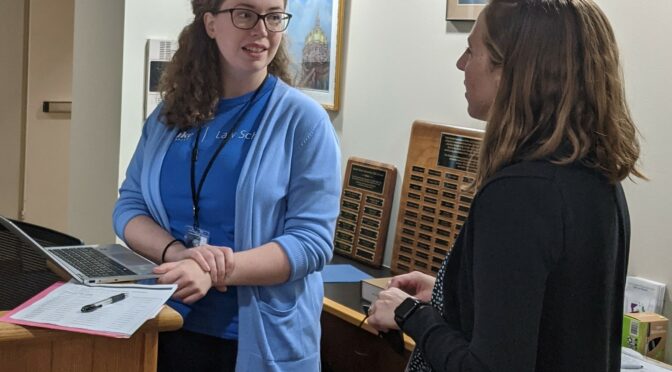Drake University Law School Legal Clinic, The University of Iowa College of Law’s Center for Human Rights, and Iowa Migrant Movement for Justice (Iowa MMJ), with funding support from the U.S. Department of Health and Human Services, are partnering to create ALL Iowa, a new collaboration to provide immigration legal assistance to Afghan nationals in Iowa who came to the United States as part of Operation Allies Welcome. The Iowa Department of Health and Human Services will administer the funding for this effort.
Following the Taliban seizure of power in Afghanistan in August 2021, the U.S. airlifted thousands of Afghans seeking safety from immediate threats of violence via a program called Operation Allies Welcome. The U.S. granted a temporary status called “humanitarian parole” to most Afghans who entered the U.S. through Operation Allies Welcome. Over 1,000 Afghans arrived in Iowa through the program.
ALL Iowa will aid in addressing the critical need for immigration legal services for this population and help to secure the safety of Afghans in Iowa who remain under threat if they return to Afghanistan. “Many people do not realize that our evacuated Afghan allies have no direct path to permanent protection in the U.S., making high-quality low-cost legal immigration services of utmost importance. This funding will increase access to these much-needed services throughout Iowa,” states Ann Naffier, managing attorney and co-legal director at Iowa MMJ.
Services to be made available through this collaboration will be diverse and engage communities statewide. Drake University will create and operate a virtual help desk to answer general questions and provide limited general advice and referral services. Iowa MMJ, the University of Iowa College of Law Legal Clinic and the Drake University Legal Clinic will directly represent many Afghans, as well as expand clinics in communities around the state, to provide Afghan families with assistance in filing the most common applications available to Afghans, such as Temporary Protected Status, Special Immigrant Visas, and asylum. The University of Iowa Center for Human Rights will help coordinate and administer the collaboration.
ALL Iowa will also engage with attorneys, organizations, and pro bono programs throughout the state already aiding Afghans through their work, to enhance and support existing efforts and to help facilitate legal assistance for Afghan individuals.
Amy Weismann, assistant director for the University of Iowa Center for Human Rights, highlights that the collaboration “will address urgent needs and enhance and elevate the vital work of our law school clinics.” UI students, along with Drake students will participate in a “legal corps” to support the work of immigration legal service providers in communities throughout Iowa.
Students at both the University of Iowa College of Law and Drake University Law School will have the opportunity to engage in direct representation of Afghan nationals before federal immigration agencies, as well as aid in development of pro se materials, intake processes and needs assessment, and conduct research into best practices, under the mentorship of licensed attorneys.
Professor Suzan Pritchett, director of Clinical and Experiential Programs at Drake Law School, articulates the initiative’s potential and goals: “We are excited by the potential of this partnership to meet immediate legal needs while creating a culture of commitment to pro bono legal service and a new generation of attorneys prepared to serve our increasingly diverse communities here in Iowa.”
For more information, visit www.alliowa.org.
For more information on the role of Drake University Legal Clinic, contact Suzie Pritchett, Drake Law School Director of Clinical and Experiential Programs at suzan.pritchett@drake.edu
For more information about the role of Iowa MMJ, contact Ann Naffier, Managing Attorney and Co-Legal Director at anaffier@iowammj.org. To make an appointment with Iowa MMJ, call 515-255-9809.
For more information about the role of the University of Iowa, contact Amy Weismann, Assistant Director of the University of Iowa Center for Human Rights, at amy-weismann@uiowa.edu .
For more information on the role of the Iowa Department of Health and Human Services, contact Alex Carfrae, Public Information Officer, Iowa Department of Health and Human Services, at acarfra@dhs.state.ia.us or call 515-281-4848
— Taylor Johnson, Law School


